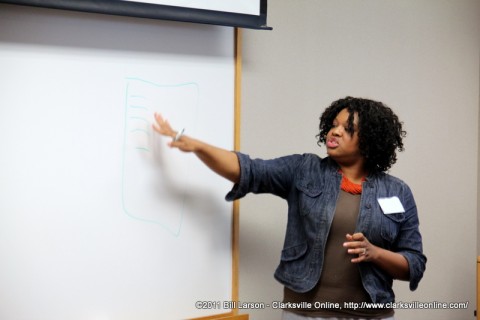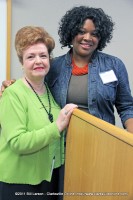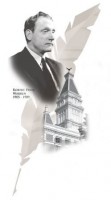
Poet-in-Residence at the Curb Center for Art, Enterprise and Public Policy at Vanderbilt University, Stephanie Pruitt is a member of the Affrilachian Poets. She was the keynote speaker for the Friday session of Clarksville Writers’ Conference at APSU.
Pruitt is the recipient of the 2010 Academy of American Poets Prize, the 2009 Sedberry Prize and was a finalist for Poets and Writers’ Maureen Egen Award. Selected by Essence Magazine as one of their 40 favorite poets in 2010, Stephanie is the author of I Am: A Poetic Journey Towards Self Definition and a chapbook, Life on Lay-a-way. She is also author of a spoken word CD, Choice Words.
Beginning her speech with a task for her audience, she asked each to begin free writing with the prompt, “rock,” and write whatever word came next into one’s mind. Her directive when time was up involved circling the first and last words to see what leaps had occurred in a couple of short minutes.
“Look at the leaps,” she said, “and examine them. That’s where innovation can come. There is so much rich space in between these two words.”
Stephanie continued, “I think of beginning writing and later writing. I want to showcase my latest work but today I want to talk about that in-between work. I believe that is where we find the rich writing. I’ll read a few of my poems—that soft tissue, that in-between space, starting 15 years ago.”
After reading one of her poems, she said, “I have a hard time with the “shoulds” because the only hard and fast rule is ‘write.’ If you hear something you can use, jot it down.”

Realizing that what she said might not be agreeable to everyone, Pruitt exclaimed, “If you don’t think what I have to say is something you can use, we’re in the South and you can just say ‘Bless her heart!’”
Stephanie Pruitt is not a poet who believes that everything you write is one’s best work. “Sometimes our early work is our unruly kids who can’t be controlled,” she reminded her audience. I’ve looked at poems and realized I didn’t have one strong active verb. I relied heavily on adjectives. I’m amazed by grammar and syntax. I realize that in some of these early poems I’m telling, telling. I used little imagery.”

Every poet learns as she writes. Not every effort will win a prize. When Stephanie was stuck at one point, she decided to reverse course. “I’m going to write about what I can’t do,” she said that day. “It did teach me that there doesn’t have to be a thing called writer’s block. Even if I’m writing about not writing, I’m writing.”
Pruitt revealed, “I get tired of hearing my own voice, probably because I talk to myself a lot.”
One of the interesting techniques she uses when she reads is her singing of a line here and there.
Interspersed with her discussion of writing, Stephanie read her poetry (which you can hear and watch as you see our accompanying video of her speech).
Stephanie reminded her audience, “We put ourselves down a lot as writers. Come on! We could do so many other things. Let me not join in the bandwagon and beat myself down. We get all those rejection letters. We say that they’re all stupid—and maybe they are. I can constructively tear up a poem without tearing myself down. We have to separate what we have written from ourselves as a person. I just wrote a junky line, but I’m not a junky person.

“Questioning myself as I got rejection after rejection, I thought, ‘What am I doing here?’ It’s important not to internalize that rejection,” an important premise every writer needs to remember.
“With my short chapbook, I became very aware of audience,” Pruitt remembered. “I’ve come to separate my writing process from my editing process. Put all the critics out the door. It’s me and the page. I am thinking a little bit more about the reader. I’m interested in the reader understanding what is going on.
“In the moment when I’m writing, that’s my time alone.













